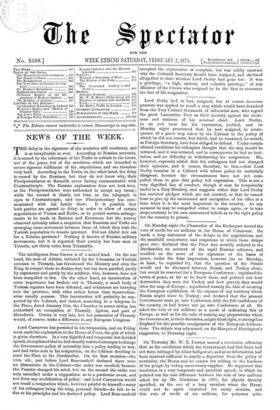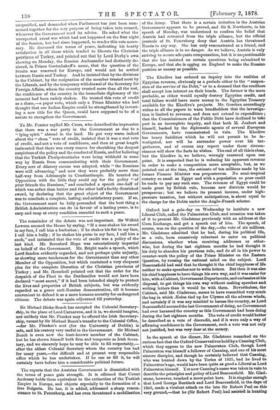On Thursday Mr. W. E. Forster moved a resolution, affirming
that as the conditions which the Government had laid down had not been infringed by either belligerent, and as no information had been received sufficient to justify a departure from the policy of neutrality, the House sees no reason for adding to the burdens of the people by voting unnecessary supplies. He supported this resolution in a very temperate and practical speech, in which he pointed out the vast difference between the vote of two millions asked for by Mr. Gladstone in 1870, for objects directly specified, on the eve of a long vacation when the House could not be again consulted for many months, and this vote of credit of six millions, for purposes quite
unspecified, and demanded when Parliament has just been sum- moned together for the very purpose of being taken into council, whenever the Government need its advice. He asked what the unexpected event was which had not happened on the first night of the Session, but had since happened, to render this vote neces- sary. lie discussed the terms of peace, indicating his hearty satisfaction in all those which tended to liberate the Christian provinces of Turkey, and pointed out that by Lord Derby's own showing on Monday, the Russian Ambassador had distinctly de- clared, in Prince Gortschakoff's name, that the question of the Straits was reserved for Europe, and would not be settled between Russia and Turkey. And he insisted that by the divisions in the Cabinet, by the resignation of the member trusted most by the Liberals, and by the temporary withdrawal of the Secretary for Foreign Affairs, whom the country trusted more than all the rest, the confidence of the country in the immediate diplomacy of the moment had been rudely shaken. He treated this vote of credit as a sham,—a paper vote, which only a Prime Minister who had thought that our Indian Empire could be strengthened by invent- ing a new title for the Queen, could have supposed to be of a nature to strengthen the Government.



































 Previous page
Previous page